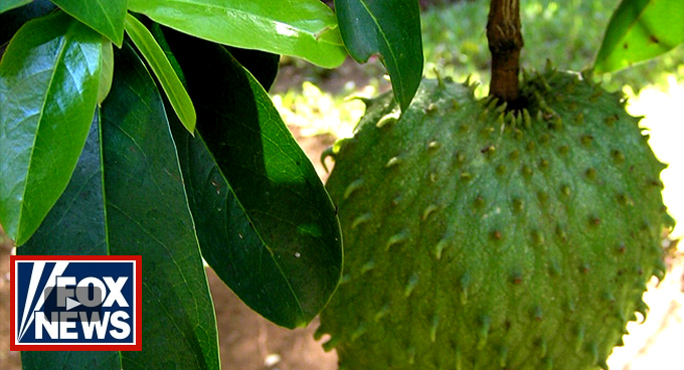Soursop fruit (Annona muricata). Photo taken at the Jardin d'Éden botanical park
Researchers are always developing new drugs and therapies to treat cancer. But as The Medicine Hunter, Chris Kilham, tells Dr. Manny are also solutions in the natural world.
Plants: Cat's Claw, Graviola Fruit, Soursop, Coffee
Cancer Fighters Derived From Nature
By Chris Kilham, Fox News, July 2013
In the war against cancer, nature plays a big role in treatment. The chemotherapeutic aid Taxol, for example, comes from the Pacific yew tree. The cancer fighting agent Krestin comes from maitake mushroom. And vinblastine one of the most celebrated drugs for treating cancer of the lymphatic system, lungs and breasts, comes from the Madagascar periwinkle. Today, research into new forms of cancer treatment is ongoing with extracts of sea creatures from coral reefs, toxins from scorpions, and many other natural substances.
Natural cancer fighters go undeveloped when pharmaceutical companies can’t secure a firm patent position with these remedies. When information about the cancer-fighting properties of a certain substance is already known and in the public domain, it’s difficult or impossible to patent the use of those agents. Only if a company can create a slightly modified version of molecules – effectively new inventions – will they proceed with drug development. This process is difficult and often impossible due to the complexity of substances found in nature – and newly invented compounds may not necessarily work.
Among well-documented, natural cancer fighters not yet used in conventional cancer treatment are Soursop (Graviola) Annona muricata, and Cat’s Claw (Uncaria tomentosa). Both derive from the Amazon rainforest, and both have been investigated with good success for decades. Soursop is a tropical tree that yields a popular, luscious fruit that has been widely enjoyed in South America since antiquity. While the fruit is a sweet treat, the stem, bark and fruit seeds possess very potent and well-documented anti-cancer properties.
In soursop, compounds called acetogenins demonstrate very powerful activity against many forms of cancer cells, without harming healthy cells at all. This is because cancer cells have unique enzymes in their cell walls, and the acetogenins in soursop specifically disrupt those enzymes. Much of the research into soursop as a cancer fighter has been conducted at Purdue University in Indiana, and the researchers involved have filed for a few patents.
The acetogenins in soursop are especially promising, because they also counteract multi-drug resistance (MDR). This common phenomenon occurs when cancer cells mutate and develop a process that pushes cancer drugs out of, and away from, the cancer cells. But the acetogenins defeat this process. Additionally, the acetogenins in soursop block the cancer cells’ ability to use ATP, or adenosine triphosphate. This is the main energy unit of all cells. When this is blocked, the cancer cells starve and die, all without harming healthy cells around them.
Many people are not waiting for the development of a costly drug from soursop. Instead, they are using various natural soursop extract products currently available on the market. A very large number of people have reported success with this and claim to experience remission. But because there are no large, controlled clinical studies, the FDA dismisses these personal recoveries.
The other Amazonian cancer fighter, Cat’s Claw, is a woody vine. The inner bark is a popular remedy for the treatment of inflammation, but it also enjoys a secure place as a cancer fighter. Widely employed by natives, Cat’s Claw contains a group of documented anti-cancer agents known as oxindole alkaloids. In fact, an extract of Cat’s Claw is approved in Austria as an adjunct therapy for reproductive cancers – most notably breast cancer.
Oxindole alkaloids in Cat’s Claw appear to fight the growth of breast cancer cells by inhibiting the binding of estrogen to those cells. They also help to prevent cell mutation and assist in the repair of cellular DNA. Furthermore, when used with other anti-cancer drugs, extracts of Cat’s Claw help to reduce nausea, hair loss, weight loss and other problems associated with treatment. As with soursop, many people use Cat’s Claw on their own, as part of a holistic approach to cancer treatment and as a replacement for the drug Tamoxifen. None of this has yet been met with FDA approval.
In nature, many plants, fungus and toxic creatures contain compounds that help to fight cancers of various types. In the cases of soursop and cat’s claw, we have documented remedies that have established their worth beyond traditional use.


